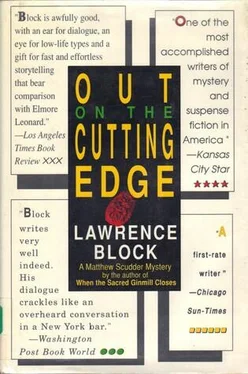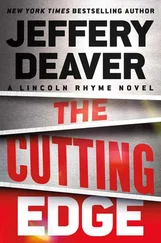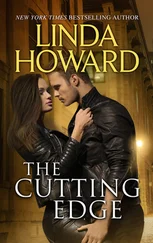I tied my tie, grabbed up my keys and wallet. There was nobody waiting for me in the lobby. I went outside and saw the car at the curb, parked next to a hydrant directly in front of the hotel. The big silver Cadillac. Tinted glass all around, but I could see him behind the wheel now because he had lowered the window on the passenger side and was leaning halfway across the front seat, motioning me over.
I crossed the pavement, opened the door. He was wearing a white butcher’s apron that covered him from the neck down. There were rust-colored stains on the white cotton, some of them vivid, some of them bleached and faded. I found myself wondering at the wisdom of getting into a car with a man so dressed, but there was nothing in his manner to lead me to fear that I was going to be taken for that sort of ride. His hand was out and I shook it, then got in and drew the door shut.
He pulled away from the curb, drove to the corner of Ninth and waited for the light. He asked again if he’d awakened me and I said he hadn’t. “Your man at the desk said you weren’t answering,” he said, “but I made him ring again.”
“I was in the shower.”
“But you had a night’s sleep?”
“A few hours.”
“I never got to bed,” he said. The light turned and he made a fast left in front of oncoming traffic, then had to stop for the light at Fifty-sixth. He had touched a button to raise my windshield, and I looked through tinted glass at the morning. It was an overcast day, with the threat of rain in the air, and through the dark window the sky looked ominous.
I asked where we were going.
“The butchers’ mass,” he said.
I though of some weird heretical rite, men in bloody aprons brandishing cleavers, a lamb sacrificed.
“At St. Bernard’s. You know it?”
“Fourteenth Street?”
He nodded. “They have daily mass at seven in the main sanctuary. And then there’s another mass at eight in a small room off to the left, and there’s only a handful ever to come to it. My father went every morning before work. Sometimes he’d take me with him. He was a butcher, he worked in the markets down there. This was his apron.”
The light turned and we cruised down the avenue. The lights were timed, and when one was out of sync he slowed, looked left and right, and sailed on through it. We caught a light we couldn’t run at one of the approaches to the Lincoln Tunnel, then made them all clear to Fourteenth Street, where he hung a left turn. St. Bernard’s was a third of the way down the block on the downtown side of the street. He pulled up just short of it and parked in front of a storefront funeral parlor. Signs at the curb prohibited parking during business hours.
We got out of the car and Ballou waved at someone inside the funeral parlor. Twomey & Sons, the sign said, and I suppose it was Twomey or one of his sons who waved back. I kept pace with Ballou, up the steps and through the main doors of the church.
He led me down a side aisle and into a small room on the left, where perhaps a dozen worshipers occupied three rows of folding chairs. He took a seat in the last row and motioned for me to sit next to him.
Another half-dozen people found their way into the room during the next few minutes. There were several elderly nuns in the group, a couple of older women, two men in business suits and one in olive work clothes, and four men beside Ballou in butchers’ aprons.
At eight the priest entered. He looked Filipino, and his English was lightly accented. Ballou opened a book for me and showed me how to follow the service. I stood when the others stood, sat when they sat, knelt when they knelt. There was a reading from Isaiah, another from Luke.
When they gave out communion, I stayed where I was. So did Ballou. Everyone else took the wafer, except for a nun and one of the butchers.
The whole thing didn’t take all that long. When it was over Ballou strode from the room and on out of the church, and I tagged along in his wake.
On the street he lit a cigarette and said, “My father went every morning before work.”
“So you said.”
“It was in Latin then. They took the mystery out when they put it in English. He went every morning. I wonder what he got out of it.”
“What do you get out of it?”
“I don’t know. I don’t go that often. Maybe ten or twenty times in a year. I’ll go three days in a row and then I’ll stay away for a month or two.” He took another drag on his cigarette and threw the butt into the street. “I don’t go to confession, I don’t take communion, I don’t pray. Do you believe in God?”
“Sometimes.”
“Sometimes. Good enough.” He took my arm. “Come on,” he said. “The car’s all right where it is. Twomey won’t let them tow it or ticket it. He knows me, and he knows the car.”
“I know it, too.”
“How’s that?”
“I saw it last night. I copied the plate number, I was going to run it through Motor Vehicles today. Now I won’t have to.”
“You wouldn’t have learned much,” he said. “I’m not the owner. There’s another name on the registration.”
“There’s another name on the license at Grogan’s.”
“There is. Where did you see the car?”
“On Fiftieth Street a little after one. Neil Tillman got into it and you drove away.”
“Where were you?”
“Across the street.”
“Keeping an eye out?”
“That’s right.”
We were walking west on Fourteenth. We crossed Hudson and Greenwich and I asked where we were going. “I was up all night,” he said. “I need a drink. After a butchers’ mass where would you go but a butchers’ bar?” He looked over at me, and something glinted in his green eyes. “You’ll likely be the only man there in a suit. Salesmen come in there, but not this early. But you’ll be all right. Meatcutters are a broadminded lot. Nobody’ll hold it against you.”
“I’m glad to hear that.”
We were in the meat district now. Markets and packing houses lined both sides of the street and men in aprons like Ballou’s unloaded carcasses from big trucks and hooked them up onto the overhead racks. The raw stink of the dead meat hung in the air like smoke, overriding the burnt reek of the trucks’ exhaust. Beyond, at the end of the street, you could see dark clouds lowering over the Hudson, and high-rise apartments on the Jersey side. But for these last, the whole scene looked as though it had sprung from an earlier time. The trucks should have been horse-drawn; then you’d have sworn you were in the nineteenth century.
The bar he took me to was on Washington Street at the corner of Thirteenth. The sign said bar, and if it had more of a name than that they were keeping it a secret. It was a small room, its board floor liberally strewn with sawdust. There was a sandwich menu posted, and a pot of coffee made. I was glad to see that. It was a little early in the day for Coca-Cola.
The bartender was a beefy fellow with a flattop haircut and a brushy moustache. There were three men standing at the bar, two of them in butcher’s aprons, both of the aprons richly bloodstained. There were half a dozen square tables of dark wood, all of them empty. Ballou got a glass of whiskey and a cup of black coffee from the bar and led me to the table that was farthest from the door. I sat down. He started to sit, then looked at his glass and saw that it didn’t hold enough. He went back to the bar and returned with the bottle. It was Jameson, but not the premium stuff he drank at his own place.
He wrapped his big hand around his glass and raised it a few inches from the tabletop in a wordless toast. I raised my coffee mug in acknowledgment. He drank half the whiskey. It might have been water for all the effect it had on him.
Читать дальше












